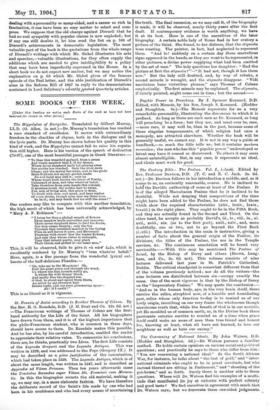Rev. Professor Davison, D.D. (T. C. and E. C. Jack.
2s. 6d. net.)—Dr. Davison follows in his introduction a middle, and, as it seems to us, an eminently reasonable, course. He is inclined to holt the Davidic authorship of some at least of the Psalms. It is of the alleged Maccabaean Psalms that he is inclined to be doubtful. While not denying that compositions of the time might have been added to the Psalms, he does not find those which show the required characteristics (xliv., laxly., lxxix., lxxxiii.) in the right place. They ought to be in the Fifth Book, and they are actually found in the Second and Third. On the other hand, he accepts as probably David's, iii., iv., viii., ix., xi. xvii., xviii., xix. (as to the first part), xxiii., xxiv., and, more doubtfully, one or two, not to go beyond the First Book (i.-xlii.) The introduction in the main is instructive, giving a number of facts about the general origin of the Psalter, its divisions, the titles of the Psalms, the use in the Temple services, &c. The continuous annotation will be found very serviceable.--With this may be mentioned The Psalms of Israel, by the Bishop of Derry and others (Brown, Lang- ham, and Co., 3s. 6d. net). This volume consists of nine lectures delivered last year in St. Patrick's Cathedral, Dublin. The critical standpoint is somewhat different from that of the volume previously noticed ; nor do all the writers—the nine lectures are distributed between six—occupy exactly the same. One of the most vigorous is that by the Bishop of Derry on the "Imprecatory Psalms." We may quote the conclusion :-- "And as in the human body, aye, in the very brain itself, there survive the relics, atrophied now, of a humble and humiliating past, relics whose only function to-day is to remind us of our lowly origin, inscribing on our very frame the wholesome though unwelcome truth that, while the breath of God is in our nostrils, yet He moulded us of common earth, so, in the Divine book these passionate outcries survive to remind us of a time when grace itself could make no more of man than true friend and honest foe, knowing at least, what all have not learned, to love our neighbour as well as hate our enemy."


































 Previous page
Previous page